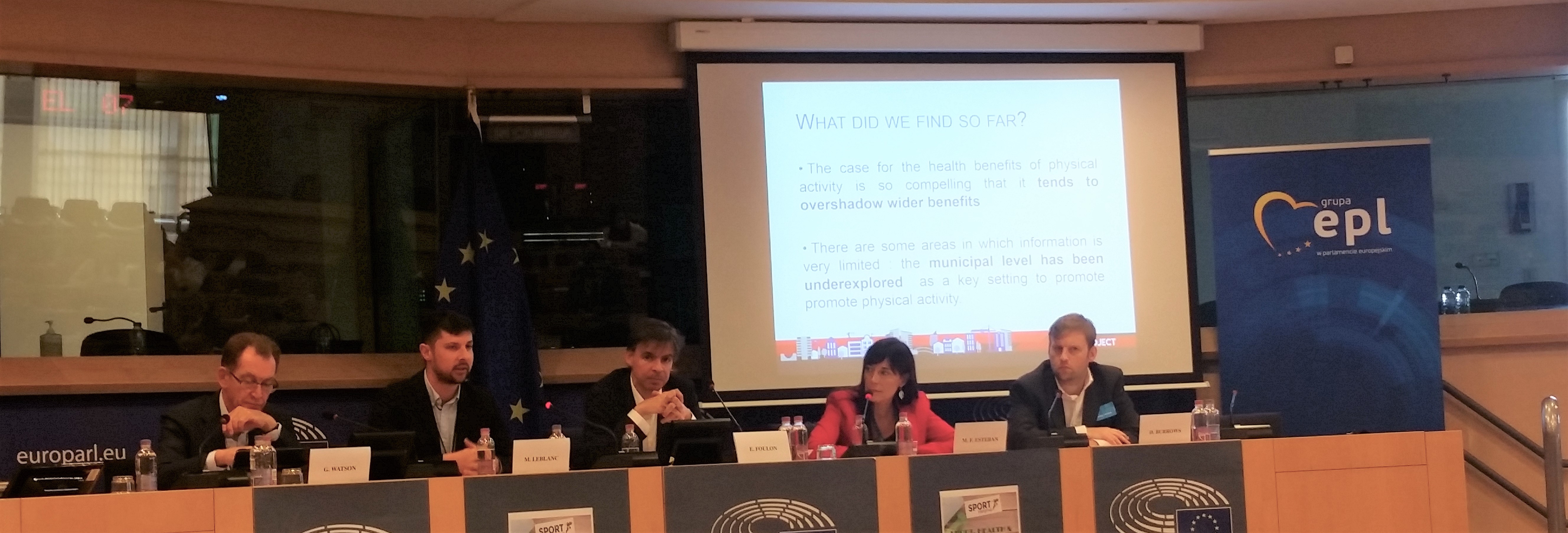Sport and Citizenship invited to present PASS project milestones to the EP’s Sport Intergroup
The European Parliament’s Sport Intergroup held an encouraging conference on September 26th, in Brussels. Sport, Health & Nutrition: benefits and risks was divided into two discussions, the first on Promoting an Active Life from an European Perspective and the second on Nutrition, Hydration and Sports: preventing risks and European challenges, both animated by a panel of diverse speakers ranging from EU officials to private corporation representatives and passing by non-governmental organisations. The variety of speakers and attendees alike reflects the next big step sport and physical activity face: fostering cross-sector and cross-network partnerships.

Sport and Citizenship not only attended but also took full part in the first panel, as our Head of European Affairs Maxime Leblanc presented the Promoting Active Cities Throughout Europe Project. Following the success of the near-ending PASS project, Sport and Citizenship’s PACTE project was recently selected for funding under the Erasmus + program. It is intended to be a follow-up of PASS which found that 210 million Europeans are inactive, costing the EU28 80 billion euros each year and sadly, that 66% of local decision makers are unaware of the situation. In this way, PACTE aims to provide thorough insight into European municipalities’ sport policies and practices since, local levels of governing have been detected as an essential starting point.
Those present agreed the EU is increasingly taking sport and physical activity into account however the Union does not have the power to impose itself on Member States- and neither does it seek to do so. One of the arising issues to face is how to advise Member Sates to promote and facilitate sport in a way that will inspire them to take actions accordingly? It is from this perspective that PACTE has targeted to evaluate, support and inspire local authorities as they have the most direct impact upon their citizens. But as was pointed out, cross-sector projects can be a tricky task to get going- somebody needs to take the initiative and pursue it, and that somebody should be the municipalities of Europe.
To grasp the necessity and urgency of promoting sport, Nike’s Global Community Impact Senior Director Dan Burrows put words on the numbers. More than a third of children in Europe do not meet the World Health Organisation standards of physical activity, making them the least active generation in history.
Later, Richard Bailey the Sport and Health manager of the ICSSPE shared information that was all the more alarming- such as the fact than Physical inactivity today is what Tabaco was a few decades ago resulting in today’s children having a shorter life expectancy than their parents. He equally shared the difference between sport and physical activity as he vouched to promote the latter. Indeed, sport rings with a certain shape of elitism via competition and sole winners, and it has been shown that competitive sports have the strongest correlation to children dropping out from sports. In this way, the need to teach and provide children with healthy meals and quality physical activity within school, was made crystal clear to all for present and future benefits.










 MEMBERSHIP
MEMBERSHIP CONTACT
CONTACT FACEBOOK
FACEBOOK